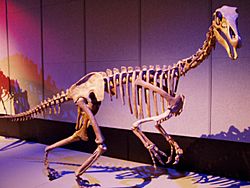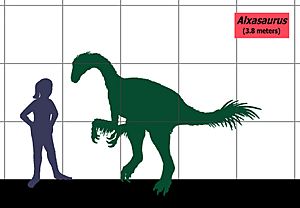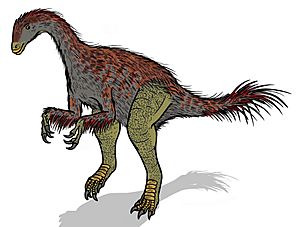Alxasaurus facts for kids
Quick facts for kids AlxasaurusTemporal range: Lower Cretaceous
|
|
|---|---|
 |
|
| Restored skeleton, Royal Tyrrell Museum | |
| Scientific classification | |
| Kingdom: | |
| Class: | |
| Superorder: | |
| Order: | |
| Suborder: | |
| Superfamily: | |
| Family: |
Alxasauridae
|
| Genus: |
Alxasaurus
|
Alxasaurus was a unique dinosaur. Its name means "Alxa lizard." It lived during the Lower Cretaceous period, about 112 to 100 million years ago. This dinosaur was a theropod, but unlike many theropods, it ate plants. It was a herbivore. Alxasaurus was quite large, growing to about 13 feet (4 meters) long. It weighed around 800 to 900 pounds (350 to 400 kg). Scientists have found five incomplete fossil skeletons of Alxasaurus in Mongolia.
Naming the Alxa Lizard
A Canadian scientist named Dale Russell and his Chinese partner, Dong Zhiming, first studied and named this dinosaur. They wrote about it in a science paper in 1993. Even though the paper was dated 1993, it actually came out in early 1994.
The name Alxasaurus comes from the Alxa Desert in Inner Mongolia. This desert is also called the "Alashan" desert. The second part of the name, sauros, is an Ancient Greek word meaning "lizard." The Alxa League is also a region in Inner Mongolia, People's Republic of China.
The specific name for this dinosaur is A. elesitaiensis. This part of the name comes from Elesitai, a village in the region. The fossil remains of Alxasaurus were found near this village.
Finding the Fossils

Scientists found five Alxasaurus skeletons in the Bayin-Gobi Formation. This is a rock layer in Inner Mongolia. These fossils are from the Albian stage of the Early Cretaceous Period. This means they are about 112 to 100 million years old.
The most important skeleton is called the holotype. It is named IVPP 88402a. This skeleton is the largest and most complete of the five found. It includes the lower jaw (called the mandible) with some teeth. It also has many leg and arm bones, ribs, and backbones (called vertebrae). This includes all five hip vertebrae (called sacral vertebrae) and the first 19 tail vertebrae.
The other four skeletons, along with the holotype, give scientists a good idea of most of the bones in the Alxasaurus body. Only the skull is largely missing from the discoveries.
Images for kids
See also
 In Spanish: Alxasaurus elesitaiensis para niños
In Spanish: Alxasaurus elesitaiensis para niños
 | James B. Knighten |
 | Azellia White |
 | Willa Brown |



